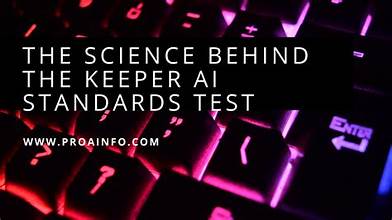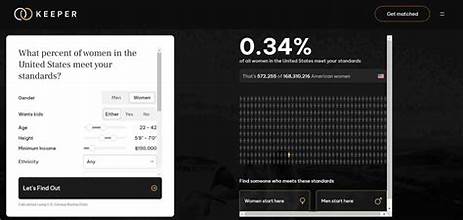Keeper AI Standards Test: A Comprehensive Guide to Evaluating AI Systems

The rapid advancements in artificial intelligence (AI) technology have ushered in a new era of possibilities, transforming industries from healthcare to finance, transportation, and beyond. With the increasing adoption of AI across various domains, it is more critical than ever to ensure that these systems operate ethically, reliably, and in compliance with standards that safeguard human values and societal norms. This is where the Keeper AI Standards Test comes into play. The Keeper AI Standards Test is an essential framework designed to assess and ensure AI systems align with these important ethical, technical, and regulatory guidelines.
In this comprehensive guide, we will explore the significance of the Keeper AI Standards Test, its methodology, and how it contributes to the responsible development and deployment of AI technologies. Whether you are an AI researcher, developer, or industry professional, understanding the Keeper AI Standards Test will provide valuable insights into maintaining AI systems that are safe, trustworthy, and aligned with global standards.
Table of Contents
What is the Keeper AI Standards Test?
The Keeper AI Standards Test is an evaluative framework aimed at assessing AI systems against a set of predefined standards and criteria. These standards encompass various aspects of AI, including performance, fairness, transparency, accountability, and compliance with legal and ethical guidelines. The test is designed to help developers and organizations identify potential issues within AI systems before they are deployed in real-world applications.
By using the Keeper AI Standards Test, developers and businesses can evaluate AI technologies to ensure they meet necessary regulatory, social, and ethical requirements. The test aims to improve the reliability, trustworthiness, and overall effectiveness of AI, ensuring that these systems benefit society without causing harm or unintended consequences.
The Importance of AI Standards
AI has the potential to significantly impact every aspect of modern life, from medical diagnostics to autonomous driving. However, with this potential comes the risk of misuse, bias, and unintended outcomes. In many cases, AI systems operate as black boxes, making decisions that can be difficult to interpret or challenge. This lack of transparency, combined with the complexity of AI algorithms, has raised concerns about accountability, bias, privacy, and other ethical issues.
The Keeper AI Standards Test serves as a solution to these concerns by providing a systematic way to evaluate AI technologies. These standards are essential for several reasons:
- Ethical Concerns: AI systems must be designed to respect human rights, prevent discrimination, and ensure that they do not perpetuate harmful biases. The Keeper AI Standards Test helps developers identify and address these concerns.
- Regulatory Compliance: As AI technology evolves, governments and regulatory bodies worldwide are implementing laws and frameworks to govern AI systems. The Keeper AI Standards Test ensures that AI technologies are compliant with these evolving regulations.
- Transparency and Accountability: Many AI systems operate as “black boxes,” meaning their decision-making processes are not transparent. The Keeper AI Standards Test helps ensure that AI systems are explainable and accountable, promoting trust among users and stakeholders.
- Performance and Reliability: Ensuring that AI systems function as expected and deliver accurate, consistent results is critical. The Keeper AI Standards Test evaluates performance to ensure that AI systems meet the necessary reliability benchmarks.
- Public Trust: Public trust in AI systems is vital for their successful integration into society. By adhering to established standards and undergoing the Keeper AI Standards Test, developers can demonstrate their commitment to creating AI technologies that are safe, ethical, and trustworthy.
Key Components of the Keeper AI Standards Test

The Keeper AI Standards Test is not a one-size-fits-all solution but a flexible framework that can be tailored to different industries and applications. However, there are several core components that the test evaluates, and these include:
- Fairness and Bias Mitigation: One of the central concerns in AI development is the potential for biased decision-making, which can result in unfair outcomes for certain individuals or groups. The Keeper AI Standards Test includes specific metrics to evaluate fairness and identify biases in data and algorithms. Developers are encouraged to apply methods to reduce bias and ensure that AI systems do not perpetuate existing societal inequalities.
- Transparency and Explainability: AI models, especially deep learning models, are often criticized for their lack of interpretability. The Keeper AI Standards Test assesses the transparency of the AI system, including whether its decision-making process can be understood and explained to non-experts. This transparency is crucial for building public trust and ensuring accountability.
- Privacy Protection: Data privacy is a significant concern when it comes to AI, especially when personal and sensitive information is involved. The Keeper AI Standards Test evaluates whether an AI system follows best practices for data security and privacy, ensuring that personal information is handled responsibly and in compliance with relevant privacy laws such as GDPR.
- Safety and Security: AI systems, particularly autonomous systems like self-driving cars and drones, must operate safely and securely. The Keeper AI Standards Test evaluates the system’s resilience to external threats and its ability to handle unexpected situations without causing harm to users or the environment. This component is particularly relevant in applications where human lives are at stake.
- Performance Metrics: The Keeper AI Standards Test also evaluates the performance of AI systems, assessing factors like accuracy, efficiency, scalability, and robustness. It is important to ensure that AI systems can perform their tasks effectively, even in unpredictable or challenging environments.
- Accountability and Governance: AI systems must be accountable, meaning that there should be clear lines of responsibility for their actions and outcomes. The Keeper AI Standards Test assesses whether the AI system includes appropriate mechanisms for oversight and governance, such as documentation, audit trails, and human oversight where necessary.
- Legal and Regulatory Compliance: As AI technology continues to evolve, so too do the laws and regulations surrounding its use. The Keeper AI Standards Test ensures that AI systems comply with local and international regulations, including those related to data protection, intellectual property, and consumer rights.
How to Implement the Keeper AI Standards Test
Implementing the Keeper AI Standards Test is a step-by-step process that involves several stages:
- Initial Assessment: The first step is to conduct an initial assessment of the AI system. This involves reviewing the system’s purpose, data sources, and objectives to determine which standards are most relevant for evaluation. Developers should also identify any potential ethical concerns related to the system’s design or functionality.
- Benchmarking: Once the relevant standards have been identified, developers can begin benchmarking the AI system against these criteria. This involves running tests, reviewing code and algorithms, and conducting simulations to evaluate the system’s performance, fairness, transparency, and other factors.
- Risk Analysis: The Keeper AI Standards Test includes a risk analysis component to identify potential risks associated with the AI system, such as data breaches, biases, or safety hazards. Developers should address these risks by refining the system’s design or implementing mitigation strategies.
- Documentation and Reporting: Throughout the testing process, it is essential to document the results and findings. The Keeper AI Standards Test encourages developers to create detailed reports outlining how the system meets or fails to meet each of the predefined standards. These reports can be used to guide further development and ensure continuous improvement.
- Continuous Monitoring: AI systems must be continuously monitored after deployment to ensure that they continue to operate in accordance with the standards. The Keeper AI Standards Test emphasizes the importance of ongoing monitoring to identify any emerging issues and address them promptly.
Benefits of the Keeper AI Standards Test

The implementation of the Keeper AI Standards Test offers numerous benefits for developers, businesses, and society as a whole:
- Improved AI Trustworthiness: By adhering to recognized standards, developers can create AI systems that are more transparent, accountable, and trustworthy. This builds public confidence in the technology and its applications.
- Reduced Risks: The Keeper AI Standards Test helps developers identify and mitigate risks early in the development process, reducing the likelihood of costly mistakes or harmful outcomes.
- Ethical AI Development: The test ensures that AI systems are developed in line with ethical principles, promoting fairness, equality, and the protection of human rights.
- Regulatory Compliance: By ensuring that AI systems comply with relevant regulations, the Keeper AI Standards Test helps businesses avoid legal issues and stay ahead of regulatory changes.
- Enhanced Innovation: Standardized testing can drive innovation by providing developers with clear guidelines for creating new AI technologies that are safe, effective, and ethical.
Also read Connections Answer: How Understanding Connections Can Improve Your Life
Conclusion
As AI technology continues to evolve at a rapid pace, it is crucial to ensure that these systems meet high standards of performance, fairness, transparency, and accountability. The Keeper AI Standards Test offers a robust framework for evaluating AI systems against these important criteria. By adopting and adhering to the Keeper AI Standards Test, developers can help create AI technologies that are ethical, reliable, and beneficial for society. Whether you are an AI researcher, developer, or industry leader, understanding and implementing the Keeper AI Standards Test will be a key step in shaping the future of AI.
In summary, the Keeper AI Standards Test is not just a tool for testing AI; it is an essential framework for building responsible, transparent, and ethical AI systems.




